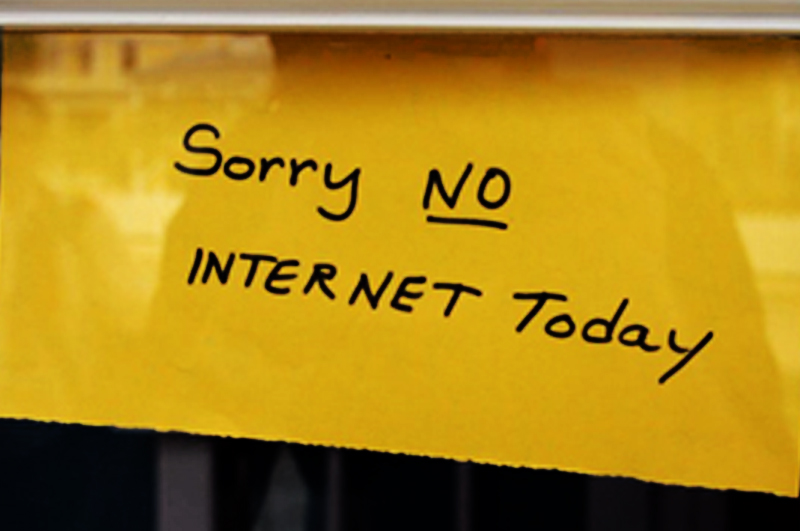While most of us enjoy a few cookies for dessert, there is another type of cookie we deal with on a daily basis and their consumption is not entirely voluntary or obvious: Internet cookies.
We use Internet cookies all the time when opening a web page; they act as pieces of data sent to our computer or phone when visiting a page and are stored in our device’s memory. Internet cookies were meant to be a useful instrument to help facilitate web browsing. First of all, cookies load pages faster, thus reducing the time we wait to open a page. Another common use of cookies is when we log in to a website. Cookies allow the web page to remember we are logged in. Without them, websites would require our username and password every time we visit a page. One more common and useful application of cookies is when shopping online; cookies allow the website to remember your shopping cart and have it ready if you would like to add more items until checkout.
IN THE PHOTO: NO INTERNET. PHOTO CREDIT: MARCELLO GRACIOLLI/ FLICKR
Sadly, the use of cookies has radically changed over the years. While still helpful for logging in and shopping online, their use now raises serious privacy implications. Interestingly, cookies are sent to our computer just when visiting a web page but not interacting with it. Cookies are obviously a tremendous source of information; if, for instance, I’m shopping online for athletic clothing, and also happen to be searching for an iPhone case and a flight to an exotic destination, it will be very simple to put together this information and create a user profile.
Related article: “OUR EXPLOSIVE DIGITAL FUTURE – AN INTERNET PIONEER’S VISION”
Profiling then leads to “targeted ads” or “targeted mail campaigns”, not just from the page we are visiting but from “third-party websites.” Profiling is potentially the most dangerous consequence of cookies as it can be assumed that there are companies on the Internet that know a lot about us without our knowledge or direct consent. On one hand, our data will be available to promote products that are more interesting and suited to our personal tastes; on the other hand, it is clearly a form of marketing that is very intrusive into user privacy.
IN THE PHOTO: EU Privacy Directive / Changes to UK Internet Cookie Privacy Law. PHOTO CREDIT: SURIAN SOOSAY/ FLICKR
The idea that cookies from our computers and other devices are sent and shared with other websites has raised several concerns. The European Union tried to address these matters with the 2002 European Directive on Privacy and Electronic Communications – nicknamed the “Cookie Directive.” This enforced European web pages to show visitors their cookie policy and how cookies are used when first opening a web page. While all of Europe can notice this every time they first visit a site, this may not be the best way to deal with the issue.
I ask all Internet users who are reading this to see if any of them has ever read a single cookie policy in its entirety from different web pages. Normally the reading goes like this: “This website uses cookies for…’part-that-no-one-reads’…to ACCEPT, CLICK OK.” And we all of course accept without reading or pondering the potential implications.
What can we do to at least try to protect ourselves? There are three ways to monitor and protect our information other than what we are doing now.
First of all, I highly recommend installing the Internet browser Firefox and downloading Lightbeam, a simple add-on that allows users to see the interactions between the websites we visit. It essentially tells you from which sites you potentially receive cookies through a visual format of interconnecting circles that represent your browsing activities. The greater the number of circles connected to the page you visit, the more likely your data will be exchanged.
Another way to protect your data is either deleting as often as possible your browsing history and cache memory or always using the private browsing mode (incognito window). While both these options are fairly inconvenient as they require re-logging in and re-uploading for each visit, the reduced number of targeted ads is substantial.
Finally, to protect ourselves from third-party cookies we should check our Internet browsing settings. Most of the commonly used web browsers have as a default setting automatic permission to allow third-party cookies. The easiest solution against it would be to disable that setting and to not allow the exchange of cookies with other third-party websites.
IN THE PHOTO: KEYBOARD. PHOTO CREDIT: barnimages.com/ FLICKR
Lately the use of cookies by companies has become problematic in many ways. While companies use them widely to better understand consumers’ choices and tastes for marketing and it may be impossible to interrupt this process, more attention to the use of cookies from both sides should be paid.
Companies should be careful as to what kind of third-party sites they collect information for. Users should take advantage of some of the above mentioned techniques to take more control over their privacy. The combination of these two could lead to a more aware internet browsing and improved protection of your privacy.
Recommended reading: “GOOGLE SAYS IT WILL RUN ENTIRELY ON RENEWABLE ENERGY IN 2017”













